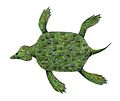Cryptoclididae
Appearance
| Cryptoclidids | |
|---|---|

| |
| Skeleton of Cryptoclidus eurymerus at the Museum of Paleontology, Tuebingen | |
| Scientific classification | |
| Domain: | Eukaryota |
| Kingdom: | Animalia |
| Phylum: | Chordata |
| Class: | Reptilia |
| Superorder: | †Sauropterygia |
| Order: | †Plesiosauria |
| Clade: | †Cryptoclidia |
| Family: | †Cryptoclididae Williston, 1925 |
| Genera | |
| |

Cryptoclididae is a family of medium-sized plesiosaurs that existed from the Middle Jurassic to the Early Cretaceous. They had long necks, broad and short skulls and densely packed teeth. They fed on small soft-bodied preys such as small fish and crustaceans. The earliest members of the family appeared during the early Bajocian, and they represented the dominant group of long-necked plesiosaurs during the latter half of the Jurassic.[3]
Classification
[edit]In 2010, two supposed late Cretaceous members of the group were reclassified as other kinds of plesiosauroids. Kaiwhekea was reclassified to Leptocleididae, and Aristonectes was transferred to Elasmosauridae.[4]
Cladogram based on Ketchum and Benson (2010):[4]
| Cryptoclididae | |
References
[edit]- ^ Roberts AJ, Druckenmiller PS, Cordonnier B, Delsett LL, Hurum JH. 2020. A new plesiosaurian from the Jurassic–Cretaceous transitional interval of the Slottsmøya Member (Volgian), with insights into the cranial anatomy of cryptoclidids using computed tomography. PeerJ 8:e8652 https://doi.org/10.7717/peerj.8652
- ^ Gasparini, Z.; Bardet, N. & Iturralde-Vinent, M. (2002). "A new cryptoclidid plesiosaur from the Oxfordian (Late Jurassic) of Cuba" (PDF). Geobios. 35 (2): 201–211. doi:10.1016/s0016-6995(02)00019-0.
- ^ Fischer, Valentin; Weis, Robert; Thuy, Ben (2021-02-22). "Refining the marine reptile turnover at the Early–Middle Jurassic transition". PeerJ. 9: e10647. doi:10.7717/peerj.10647. ISSN 2167-8359. PMC 7906043. PMID 33665003.
- ^ a b Ketchum, H. F.; Benson, R. B. J. (2010). "Global interrelationships of Plesiosauria (Reptilia, Sauropterygia) and the pivotal role of taxon sampling in determining the outcome of phylogenetic analyses". Biological Reviews. 85 (2): 361–392. doi:10.1111/j.1469-185X.2009.00107.x. PMID 20002391. S2CID 12193439.
External links
[edit]







